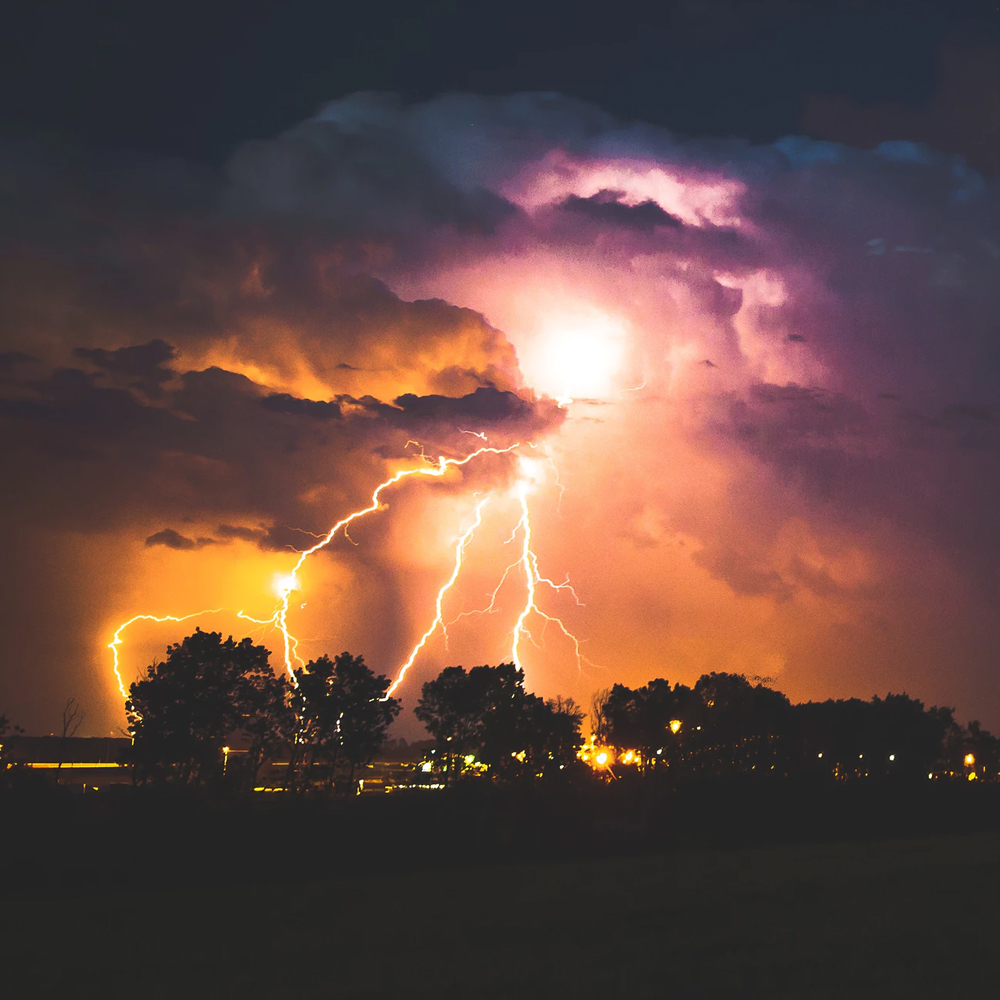Storm
Survival Tips
Be prepared! Lifesaving tips for before, during and after a super storm.
BEFORE THE STORM
Preparation:
Gather – Emergency Contacts, FirstAid kit, Non-perishable Food, Pet Supplies, Prescriptions, Batteries and a Battery-operated Radio, Flashlights, Portable Electronics Charger, shock-resistant hand tools
Create – a Buddy System, an Evacuation Plan, a Family Weather Plan, a Go Bag
Buddy System :
Network with neighbors and friends to have a community plan for emergencies. Prepare to jump into action and pool resources. This is much harder in the confusion after a storm. Neighbors may have medical skills, ham radio equipment, boats, food, standby home generators, or even live on higher ground or have spare bedrooms.
Evacuation Plan :
Know in advance where you will go in the need to evacuate. Plan your route and supplies. Make sure everyone in the family knows what/where/how in advance. Plan for managing traffic delays. Be prepared to be as comfortable as possible – ample fuel, snacks, meds, baby supplies, blankets, toys, etc.
Family Weather Plan :
Sever weather can hit unexpectedly. Select destination spots around town that offer suitable shelter and can be reached quickly if severe weather pops up. Prepare your family to know where to meet up afterwards if separated. Ideas: Police stations, fire stations, schools. Choose buildings with substantial structural integrity first. Select a meet up location that will be easy to reach and a safe environment after a storm. If your home is at risk, it may not be the best meet up destination.
Go Bag Suggestions :
Clothes, jackets, extra socks, underwear, contact solution, extra glasses, spare prescriptions, a favorite toy, snack bars, diapers, travel-size toiletries, a zipped bag with pet food, pet collar and leash. Basically, a quick travel-necessities collection in the event a quick evacuation is called for.
• Remove everything outside your home that can become a projectile: limbs, lawn furniture, grills, planters, even wind chimes.
• Bag ice as emergency water. Fill containers and pots with water. Fill sinks with water. If it’s covered, it may be consumable. If not, it can be used for pets, bathing and, in some circumstances, flushing toilets.
• Take pictures of the inside and outside of your home and all valuables. Record any special notes.
• Place all important documents, pictures and valuables in airtight plastic storage or zipping bags. Place these high on shelves, in cabinets or on top of tall furniture.
• Record necessary medical information into a digital file. Take digital pictures of important personal documents and convert as many important files to digital as possible. Keep a backup copy on a thumb drive that you can wear or carry. You may want to use a permanent marker to label the outer case so any emergency personnel could easily identify it’s purpose.
• Move furniture upstairs. Elevate furniture by sitting it on blocks. Place furniture legs into plastic containers to protect from lower levels of water.
• Condense into an ice chest – the highest cold rating possible. Ice chests can be used to keep smaller portions of consumables cold when the power is out. Opening the refrigerator causes it to loose cool faster. Frozen water bottles serve as “ice” while also remaining drinkable. Ice chests can also be placed in dry areas in case of flooding in low areas or downstair floors.
• Turn the temperature setting on refrigerators and freezers to the coldest possible settings the day before the storm. Minimize opening the appliance door.
• Unplug appliances and electronics that would be sensitive to power surges.
• Turn off power to swimming pools. Add extra chlorine. Remove panels to enclosures. Do not cover pools as the cover can be damaged. Do not empty pools as some can “float”.
• Do not ignore evacuation orders.
DURING THE STORM
• Stay in a secure room away from windows.
• Do not use flammable candles or anything that burns to prevent fires and carbon-monoxide poisoning.
• Do not use electrical devices.
• Do not leave safety until the eye and the other side of the storm passes.
• Keep a battery-operated radio with a weather station or NOAA to see if the storm has passed and what outside conditions are.
AFTER THE STORM
SAFETY :
• Stay out of all flood water. Currents you don’t see can exist. Even small amounts of water can hide items that can cause injury, animals and reptiles, electricity and even deadly germs.
• Stay away from all downed power lines.
• Leave buildings if you hear shifting or unusual noises, or if carbon-monoxide detectors go off.
• Beware of sick or injured animals. They can injure you or may harbor diseases.
• Stay clean with disposable rubber gloves or plastic bags over your hands.
• Keep all garbage contained in containers or plastic bags. If power is off, spoilage occurs faster. Odors and spoilage can attract insects, rodents and predatory animals. Spoilage can contaminate surfaces and cause illness.
• Do not run a vehicle inside a garage even if the garage door is open. Carbon monoxide poisoning can occur.
SUPPLIES :
Can goods, manual can opener, matches, paper plates & cutlery (conserves water), frozen water, bottled water, spare rags (bathing, emergency care, comfort), toilet paper, soap, antibacterial wipes, bug spray.
GAMES or BOOKS; TREATS or SNACKS :
It may take time to get back to normal. It is important to be patient and make healthy, rational decisions. Entertainment or distractions help relieve stress and keep children occupied.
ELECTRONICS :
• Keep phone contact numbers up to date.
• Social media can help with communication and information on local issues.
• Volunteer rescuers usually rely on social media and smartphone apps. Learn about: the Facebook Safety Check feature, the Red Cross Safe and Well website and smartphone apps for locating family members.
Standby Home Generators
Power You Can Count On!
A Home Standby Generator system provides whole house power within seconds of a power failure.
Our site explains it all: wheelergenerators.com or contact us at 1-800-WHEELER for more information.





